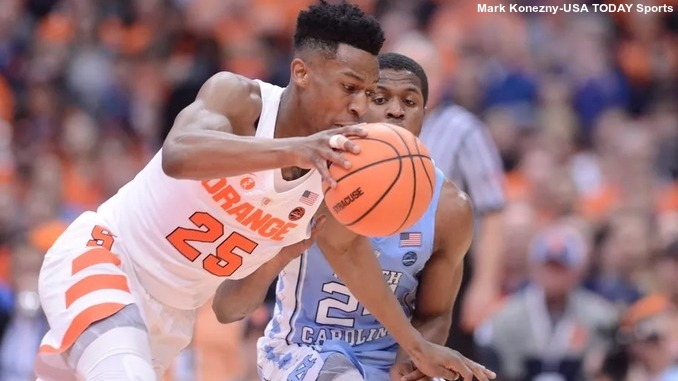
As you know by now, Syracuse guard Tyus Battle is staying put for another year. It appeared he was not given any guarantees that he would be a first round pick and, based on the feedback he got from NBA scouts and teams, there are some things he needs to work on before he moves to the next level. Since when has THAT every stopped a college basketball player from entering the draft?
Almost two weeks ago, Syracuse.com’s Mike Waters dusted off the list of Syracuse players who have entered the draft early in recent memory. Waters opined that most of the guys made the right decision to enter the draft when they did. Now, the vast majority of the time, I feel Waters does a great job and is a go-to source for Syracuse hoops news. I don’t often disagree with him. But, when I do…it’s on this subject.
Too often, I’ve watched Syracuse players jump into the professional ranks and wonder, “Why now? Stay one more year and see your stock rise.”
Sure, there are the no-doubters:
- Carmelo Anthony was picked 3rd overall in the 2003 draft after winning a national championship for Syracuse in his freshman year…duh. Get outta town and go dominate in the NBA (which he did).
- Wesley Johnson in 2010 and Dion Waiters in 2012 both (perhaps surprisingly) were drafted 4th overall. Maximizing their draft stock, it made total sense for them to each make the leap to the NBA.
Then there are others that fall between being a good decision and a bad decision:
- Jonny Flynn, drafted 6th overall in 2009, was selected by Minnesota, who passed over Stephen Curry twice to draft Ricky Rubio with the 5th pick and Flynn with the 6th pick. If not for a debilitating hip injury, Flynn may very well still be in the league.
- It’s hard to argue with the results of Michael Carter-Williams in his NBA season as Carter-Williams took home Rookie of the Year honors, averaging over 16 points and six assists a game. But, as his career has continued and he has become nothing more than a bench player, it seems as if another year at Syracuse may have done him some good to develop his skills so that they may be more sustainable in the NBA.
- While Fab Melo could have certainly used more seasoning in college, he really had no other choice but to enter the NBA Draft. He was declared academically ineligible, was selected in the first round of the 2012 draft, but played only six games in the NBA before suddenly passing away in 2017.
» Related: Tyus Battle’s returning. What does that mean for Syracuse?
But, many of those on the list that Waters labels as having made good decisions don’t seem to be as positive as the picture he paints:
- Donte Greene left after his freshman year at Syracuse and was drafted 28th in 2008. He averaged just over six points a game in his four-year NBA career and is now playing overseas. He was never able to turn his potential into consistent production.
- Jerami Grant stayed at Syracuse for two years, but wasn’t selected until the second round of the 2014 draft. While leaving early to be a second round pick is puzzling, Grant was actually afforded the opportunity for significant playing time in Philadelphia, where he was able to carve out a role for himself. He was with Oklahoma City the past two seasons and is an upcoming free agent. Make no mistake about it, his decision to leave Syracuse was a bad one, based on his draft position. But, in this case, all is well that ends well. He is poised to get paid pretty well this offseason and looks like he will have a fairly productive NBA career.
- Tyler Ennis was great in his lone year at Syracuse. Many seemed to think his draft stock was as good as it would get. He entered the draft, was drafted 18th and didn’t look back. But 18th? Am I the only one that thinks, with another year or two, that Ennis couldn’t crack the NBA lottery? Instead, Ennis stunted his development by only staying one year and seems to be nothing more than a career backup. He played in a career-high 51 games for the Los Angeles Lakers this season, but averaged just 4.1 points 1.9 assists.
- Chris McCullough’s career at Syracuse lasted just 16 games…and he felt that was enough for him to jump to the NBA. Coming off a torn ACL, he was taken 29th in 2015. He was one of the most highly recruited players out of high school and he decided it was better for him to be taken at the end of the first round than to showcase everything he could do playing a full season at Syracuse. In three seasons, he has played just 59 NBA games.
- Malachi Richardson thought a hot run to the Final Four in 2016 was enough to move on from Syracuse after his freshman season. Through two NBA seasons, the 22nd overall pick has spent more time in the D-League/G-League than in an NBA uniform.
- And most recently, Tyler Lydon left Syracuse after two productive seasons and was the 24th pick in 2017. You know how many NBA games he’s played so far? One. Just one.
The common theme for Waters’ justification of these guys all making “good” decisions? Moolah.
Lydon is guaranteed $3.3 million in his first two years. Richardson will make $4.4 million through his first three guaranteed seasons. McCullough has earned $3.7 million so far. Ennis has raked in $6.5 million in four seasons. The list goes on and on, with Waters saying that each guy has been “successful” because of a number listed in his bank account.
Since when did the amount of a guy’s paycheck determine his NBA “success”? News flash: everyone who plays in the NBA is rich compared to us mediocre athletes.
But, here’s my logic: if some of these guys stayed an extra year to work on their games in college, getting significant playing time and more direct tutelage than they get in the NBA, wouldn’t that allow them to perhaps get drafted higher the following year? A higher draft slot means more guaranteed money and maybe (just maybe) the added skills they get from sticking in college for another year allows them to contribute in the NBA more immediately, while also prolonging their careers. Does that seem to be a viable solution?
Maybe it’s a matter of personal opinion. I tend to be a Syracuse fan who roots for Syracuse alumni to do well once they play professionally, too. I once asked a friend of mine who was a Florida Gators fan if it bothered him that Tim Tebow was struggling to find success in the NFL. His response? “No. Once they leave school, I don’t really pay attention to them anymore.” That’s not me. To me, the more successful those guys are in the NBA, the more successful Syracuse is as a program.
So, in my eyes, guys like Lydon, Richardson, McCullough, Ennis and Greene did not make the right choices. They would have been better off adding another year to their Syracuse stat lines. Each had areas to improve on before entering the NBA, be it physically, mentally or both.
Some of these guys still have a chance to become something in the NBA, most notably Lydon. But rather than riding the pine, flaming out early or just being overmatched in the NBA, that extra year might have done some good in making sure that when these guys got to the league, they were set up bette for sustained success.
For more Syracuse coverage, Like our Facebook page and follow us @TheJuiceOnline.

